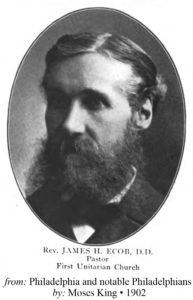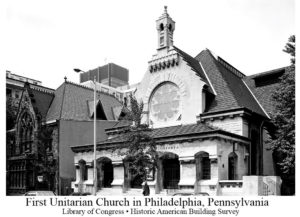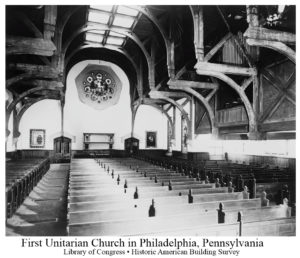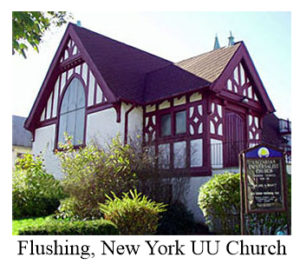
James Henry Ecob (September 4, 1844-November 6, 1921) was a minister in Unitarian, Presbyterian, and Congregational churches, and participated in and advocated for interdenominational worship and co-ordination for most of his career. He served as a minister of the First Unitarian Church of Philadelphia, 1901-07, and was the first minister at the Unitarian Congregation of Queens in Flushing, New York where he served 1907-19.
Ecob was born in Buffalo, New York, the second youngest in a large family. His father had immigrated from England, and James Henry’s mother was his father’s second wife. Both parents died when James Henry was still a child. He graduated from Hamilton College in 1869 and Andover Theological Seminary in 1872. The following October he was ordained as minister of the South Parish Congregational Church in Augusta Maine, where he served for eight years. During that time, he married Helen Lathrop Gilbert of Gilbertsville, New York, where they afterward maintained property and are buried.
Ecob moved to Albany New York in 1881 and served for more than twelve years as minister of the Second Presbyterian Church. Then, in 1892, Presbyterians brought heresy charges against Ecob’s fellow minister, Charles Augustus Briggs. Briggs was an eminent theologian and Biblical scholar at Union Theological Seminary in New York City. Briggs became an Episcopalian priest and was retained by the seminary which chose to sever its Presbyterian ties. In June of 1893, Ecob abandoned Albany and Presbyterianism and moved to the First Congregational Church in Denver, Colorado. In his last statements from his Albany pulpit, he urged liberal Presbyterians to join Congregationalists and others to create a new “free church.” Ecob’s letter of resignation refers to the stress of recent events and his need for “a complete change of climate and scene and work”, if he were not to stop working altogether.
The concerns of Ecob’s liberal Albany congregation were less with doctrinal disagreements than with insistence by doctrinal conservatives on a narrowly Presbyterian creed; the issue for the congregation thus mirrored a much more general discussion about the status of the church creed in contemporary American Protestantism and Unitarianism. The idea of a “free church” espoused by Ecob corresponded to similar proposals, intended to bring together Christians across denominational lines and even to bring Christians into greater sympathy with other religions. Unitarian restlessness in relation to Christian creeds was evident from at least the earliest post-Civil-War era, notably in the work of William James Potter as the leading promoter of the Free Religious Association, where in 1870 Thomas Wentworth Higginson had presented his speech on “The Sympathy of Religions.” James Freeman Clarke’s Ten Great Religions, a groundbreaking work on comparative religion, appeared in 1871.
The same year Ecob moved to Colorado, 1893, he also attended the World’s Parliament of Religions held in Chicago in connection with the World’s Columbian Exposition. Although the Parliament was interdenominational, its organization and the publicity for it were strongly led by the Western Unitarian Conference, in particular Jenkin Lloyd Jones, who represented a Unitarianism far more liberal and inclusive than that of the Boston-based American Unitarian Association (AUA). Ecob was also elected to the board of directors of the American Congress of Liberal Religious Societies, a new group formed at the close of the Parliament of Religions. Ecob promoted inter-denominationalism among liberal Christian churches not least as a defense against losses to conservative churches, on one hand, and complete abandonment of churches on the other. He resisted narrowly defined church creeds but remained a committed Christian throughout his life.

Ecob left Denver in September 1898 claiming the high altitude affected his family. His next experience, as the minister at First Unitarian in Philadelphia, ought to have been the pinnacle of his career, because of the size and prestige of this venerable congregation, but this was the one place where he left under something of a cloud. A newspaper report states that many in the congregation walked out of the church as Ecob, who had been asked to resign, was still preaching there for the last time (June 1907), and that they were offended by his social activism and lack of concern for what they viewed as the social norms of their congregation. Even in Philadelphia, however, Ecob had defenders, and his ministry may have helped to guide one of his younger congregants, the future poet and doctor William Carlos Williams, who attended Ecob’s church while at medical school and struck up a personal acquaintance with him and his family.
From Philadelphia, Ecob moved to Flushing, New York as minister to the recently formed Flushng Unitarian congregation. The African American inventor and draftsman Lewis H. Latimer was one of its founding members. Ecob was successful enough to enable the Flushing congregation, with financial assistance from the American Unitarian Association (AUA), to commission a church building. After serving twelve years, he retired from his Flushing ministry and returned to Augusta, Maine, where his very first church was glad of his return and grateful for his service. In 1921 he preached his last sermon in Augusta, on “The Message of Nature to God’s Children.” He died five months later.

Ecob was in some respects deeply conservative, perhaps more comfortable in the Congregationalist churches where he began and ended his career than in even a conservative Unitarian pulpit. He was horrified by contemporary approval of the poetry of Walt Whitman, In a 1907 letter to The Outlook he characterized Whitman as a “brute beast.”
Ecob was a lecturer, editorial advisor, and then contributing editor to Studies in the Gospel of the Kingdom, a publication of fellow Congregationalist minister Dr. Josiah Strong. Ecob served on the board of editorial advisers with Washington Gladdens, Walter Rauschenbusch, and Universalist John Coleman Adams. Ecob was associated with Strong’s magazine from its first issue (1908) to the last issue(1918). Although a modern reader will find Strong’s views on race and nationality thoroughly distasteful, they were evidently acceptable to the Federal Council of Churches of which Strong was a founding member, as well as to the editors of The Congregationalist who noted Ecob’s association with Strong in a warm farewell to Ecob on his retirement from the pulpit (July 14, 1921). The fairly numerous but short essays that Ecob (and his wife Helen Gilbert Ecob) published in the magazine are not obviously grounded in Strong’s ideology, but deal with a range of topics of active interest for the social reform movement of the time: education (the need for imaginative literature and the arts in the curriculum of vocational training schools), labor relations (how to achieve full representation of workers’ interests), and peace activism.
Aside from his openness to inter-denominationalism, Ecob’s ministry seems to have been distinguished by its focus on the values of community and of human beings’ connections to the natural world. The connection Ecob felt between these two ideas is illustrated in a poem he published in Munsey’s Magazine in 1911:
THE CHORAL OF THE FOREST
The forest has a thousand moods—
For every mood an answering bird.
The bird is but a living word.
To voice the spirit of the woods;
His own the singer ay must sing;
He may not touch an alien string,
Nor silent be, nor fail the key,
Lest that aerial symphony,
Which ever and forever weaves
Its mystic numbers through the leaves,
Should lack one deep or tender tone.
However dark, however lone
The shadow or the solitude,
The mighty oneness of the wood
Links singer unto singer there,
And pours one choral on the air.
As indicated above, Ecob contributed both short essays and poems to religious and literary magazines, and excerpts from his writing appear in the Dictionary of Burning Words of Brilliant Writers (1895), an anthology “of religious literature of all ages” notable, however, for its representation of major Unitarian figures such as James Martineau, William Ellery Channing, and Horace Mann. Because of his experience of narrow sectarianism, it is unsurprising that Ecob preached and wrote about the need for churches to ignore their doctrinal differences and work and worship together. Less predictable is his consistent appeal to nature and the natural world in defining his theology, and it is an excerpt on the theme of nature as “the hem of [God’s] garment” that appears in the 1895 anthology, where his writing stands next to an excerpt from the work of Michael Faraday. In the essay “A Century of Church Methods” published in Harper’s Monthly Magazine (1900), he condemns Christian asceticism predicting that “Someday, perhaps, the church will cease to be afraid of nature.”

According to contemporary reports, the congregations where Ecob served always greeted their new minister with enthusiasm and were usually sorry when he moved on. While the circumstances of his leaving Albany show that he was prepared to act on principle, he is described as a gentle man of considerable personal charm, who avoided conflict if possible.
Ecob was survived by his wife Helen Gilbert Ecob (d. 1934) and by four adult children. His wife was not only a social asset but also a respected public figure in her own right. Her book The Well-Dressed Woman (1892), which explored the negative impact of fashionable clothing on women’s health, illuminates not only its author’s views but also the likely atmosphere of the Ecob household; the title page has an epigraph by the abolitionist politician Gerrit Smith, and, in the body of the text, the author quotes from John Ruskin as a source for her stance on the interdependence of beauty and social utility. Her 1896 article defending woman suffrage–achieved in Colorado three years earlier–was included in later collections of feminist political writings, and like her husband she later contributed work on social-reform issues to The Gospel of the Kingdom. Her theological attitudes are suggested by her offering the opinion that, for example, “whatever theory of creation we may hold”, the Creator presumably had not intended people to be ugly, or for women to wear unhealthful corsets. Native Americans, in her view, observed a religion “crude but operative,” and she cites Emerson on the subject. After her husband’s death, Helen Gilbert Ecob also wrote a book Reminiscences of Early Days (1927) chronicling her family’s experience of life in what would become western New York State from their arrival from England in the eighteenth century up to 1867, although without including any autobiographical information. Her ancestors helped establish the first Congregational church in their settlement; in England they had been members of the Established Church and turned to Congregationalism because their situation on the western frontier made the connection impossible to maintain.
The Ecobs’ son Robert G. Ecob was a successful architect who also achieved some notoriety because of his scandalous divorce, followed by activism in the Alimony Payers Protective League, campaigning against alimony for unworthy ex-wives. Less is known about the Ecob daughters Frances, Katherine, and Eleanor, except that they were apparently independent (apparently enjoying fairly adventurous travel) and well educated. A grand-niece, Florence Morse Kingsley, wrote religious fiction; one of her books is said to contain a fictionalized depiction of James Ecob.
Sources
Some of Ecob’s papers along with four printed sermons are preserved at Union Theological Seminary in New York, New York. His published writings, and public reports of his activities, are scattered in local histories and in contemporary newspapers and denominational magazines, including The Congregationalist, The Outlook, and The Unitarian Register. Additional information appears in the alumni news of his college and of his college fraternity, Theta Delta Chi. Helen Gilbert Ecob’s two books are available on line.
Article by Emily Klenin
Posted September 19, 2019